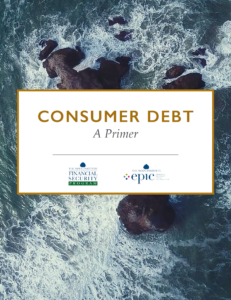First published March 2018
The Aspen Institute’s Expanding Prosperity Impact Collaborative (EPIC)—an interdisciplinary approach to illuminating and addressing critical aspects of household financial insecurity—is focusing on consumer debt. EPIC is studying this issue now because consumer debt has reached record highs amid an economy more robust than at any point since the end of the Great Recession. Unemployment is at historic lows and wages are up, leading to many rosy interpretations of current debt trends. Yet signs continue to point to the fragility of many families’ finances, and households’ experiences with debt in the current economy vary widely on demographic and geographic lines. This is a critical moment to better understand the changing dynamics of consumer debt, how households are managing the debt they are carrying, and the conditions under which it is a source of financial insecurity versus an opportunity for future mobility.
EPIC’s particular focus is on non-mortgage consumer debt, such as loans to pay for college or to purchase a vehicle, money borrowed on credit cards, and non-loan debt (i.e. municipal fines and fees, medical debt, and unpaid bills). Non-mortgage debt has not received the extensive attention given to housing borrowing, largely because of the size of the mortgage market. However, housing debt is declining as a share of household debt and current causes for concern—such as rising rate of serious delinquency in credit cards and the emergence of subprime auto loans—relate to other areas of the market. This primer distills the research on consumer debt, from its drivers and its dimensions to its impacts on households and society as a whole. EPIC will use this critical knowledge base to articulate a framework for developing solutions to improve the financial lives of millions of Americans.
